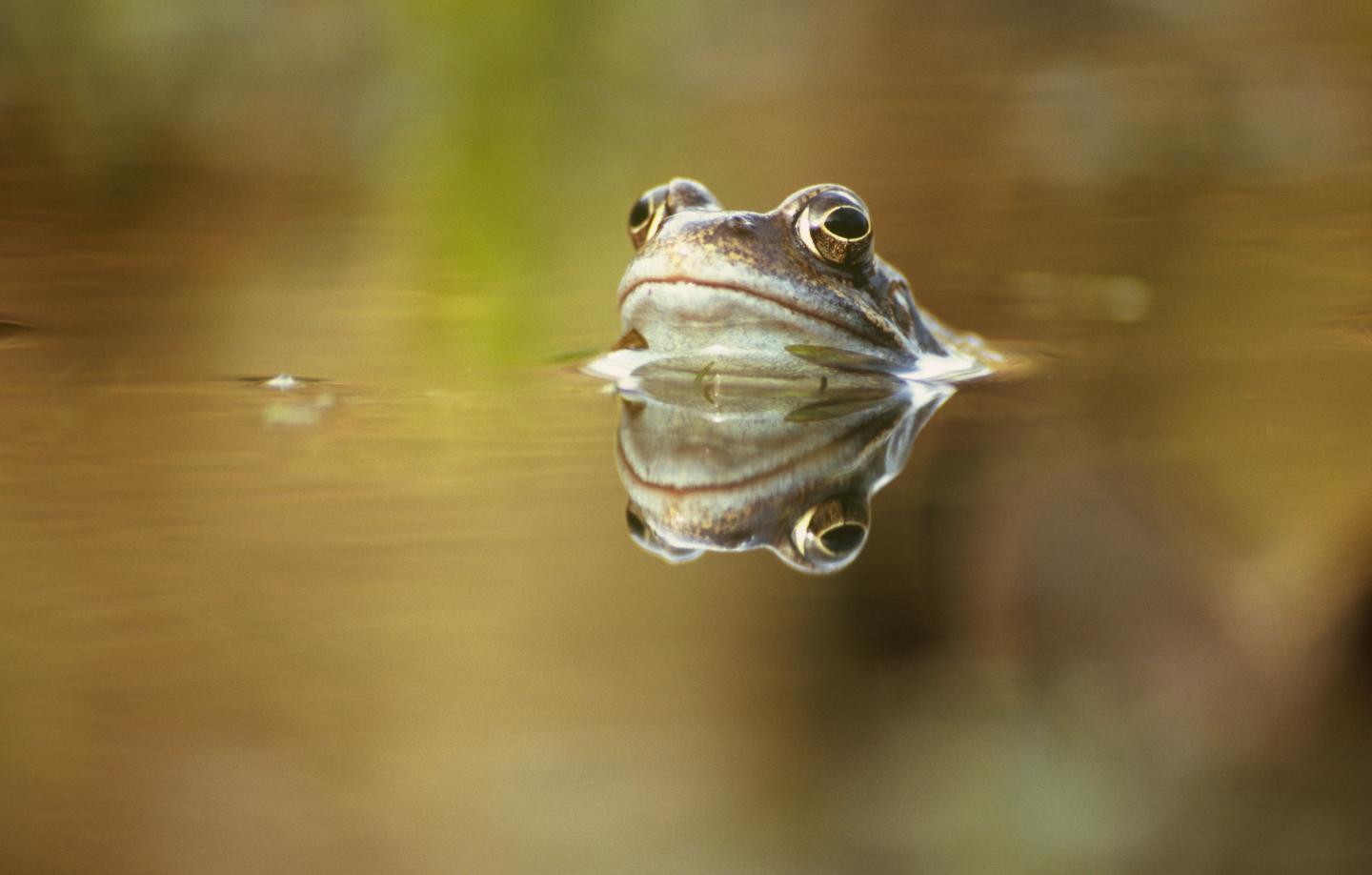Compelling research reveals fatal spread of Ranavirus will increase if carbon emissions are not reduced

Credit: Greg Hitchock
Climate change has already increased the spread and severity of a fatal disease caused by Ranavirus that infects common frogs (Rana temporaria) in the UK, according to research led by ZSL’s Institute of Zoology, UCL and Queen Mary University of London published today in Global Change Biology (10 May 2019).
Historic trends in mass-mortality events attributed to the disease were found to match the pattern of increased temperatures recorded over recent decades, with disease outbreaks predicted to become more severe, more widespread and occurring over a greater proportion of the year within the next few decades, if carbon emissions continue at their current rate.
The research conducted by international conservation charity ZSL (Zoological Society of London), UCL, Queen Mary University of London and University of Plymouth used a three-pronged approach involving cell cultures, live models and historic data from the Met Office and Froglife’s Frog Mortality Project, with the research demonstrating that warm weather where temperatures reach 16°C, dramatically increases the risk of Ranavirus causing a disease outbreak in common frogs.
The findings help explain the seasonality of the disease, with incidence peaking during the hottest months of the summer, showing that climate change could see outbreaks becoming more frequent from April to October. Disease outbreaks in the spring could result in the deaths of large numbers of tadpoles, which could have repercussions for population survival. Up to now, Ranavirus disease has been largely restricted to England, but as average monthly temperatures increase to exceed 16°C in more areas over longer periods, as predicted by the IPCC’s high carbon-emission model, the disease is likely to spread across most of the UK in the next 50 years.
Dr Stephen Price, lead author from ZSL’s Institute of Zoology and UCL said: “Climate change isn’t something that’s just happening in faraway places – it’s something real and present that’s already had hard-to-predict impacts on wildlife in our own back gardens here in the UK.
“A number of scientists have already alluded to the fact that climate change could increase the spread of disease, but this is one of the first studies that provides strong evidence of the impact of climate change on wildlife disease, and helps to explain how it may facilitate the spread of Ranavirus across the UK.”
ZSL scientists suggest that frogs may be better able to cope with infection if they have areas in which they can cool down – adding log piles, vegetation or nearby shady patches as well as keeping ponds deep will help reduce the level of sun exposure frogs receive, and thus reduce the growth rate of the virus.
Professor Trenton Garner at ZSL’s Institute of Zoology said: “Many studies in amphibian disease cannot do much beyond saying ‘we have a problem’. This research offers a number of options for mitigation; however, this is only a short-term solution of course – if we don’t eventually slow and reverse human-driven climate change, we unfortunately can only expect things to get worse for our amphibians.”
###
To find out more about ZSL’s amphibian health work, please visit: http://www.
S. J. Price, W. T. M. Leung, C. Owen, R. Puschendorf, C. Sergeant, A. A. Cunningham, F. Balloux, T. W. J. Garner, R. A. Nichols (2019). Effects of historic and projected climate change on the range and impacts of an emerging wildlife disease. Global Change Biology. https:/
Notes to editors
Media contact
Emma Ackerley, [email protected] / +44 (0)20 7449 6288
Related images available here: https:/
ZSL (Zoological Society of London)
Founded in 1826, ZSL (Zoological Society of London) is an international scientific, conservation and educational charity whose mission is to promote and achieve the worldwide conservation of animals and their habitats. Our mission is realised through our ground-breaking science, our active conservation projects in more than 50 countries and our two Zoos, ZSL London Zoo and ZSL Whipsnade Zoo. For more information visit http://www.
About UCL (University College London)
UCL was founded in 1826. We were the first English university established after Oxford and Cambridge, the first to open up university education to those previously excluded from it, and the first to provide systematic teaching of law, architecture and medicine.
We are among the world’s top universities, as reflected by performance in a range of international rankings and tables. Our community of over 41,500 students from 150 countries and over 12,500 staff pursues academic excellence, breaks boundaries and makes a positive impact on real world problems.
http://www.
Use of ZSL Images and Video
Photographs, video or graphics distributed by ZSL (Zoological Society of London) to support this media release may only be used for editorial reporting purposes for the contemporaneous illustration of events, things or the persons in the image or facts mentioned in the media release or image caption. Reuse of the picture or video requires further permission from the ZSL press office.
General Data Protection Regulation (GDPR)
You are currently on the Zoological Society London (ZSL) databases as a press contact. We class press contacts as the journalists, press officers and those working within science communications who have helped ensure the ZSL can continue its mission to ensure the public have access to the best scientific evidence and expertise through the news media when science hits the headlines. Due to the new General Data Protection Regulation (GDPR), we are letting you know that we hold and process your data under legitimate interest. At any time you can object to the holding or processing of your data, and we will remove you from our database. More information on what we hold, why we keep it and what we use it for is available in our privacy statement. If you have any further questions, please get in touch.
Media Contact
Emma Lucy Ackerley
[email protected]
Related Journal Article
http://dx.




